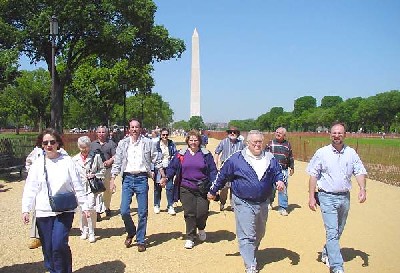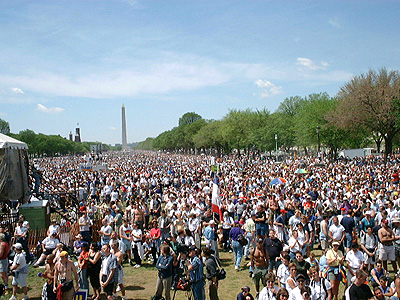Free! "This Weekend Only" Free Walking tours around the city (of Washington)
From a cultural heritage and tourism perspective, Washington has an embarrassment of riches, but a bifurcated identity--the national vs. the local--which creates significant marketing difficulties.
To most people in the United States and the world, Washington is the National Capitol, the seat of the government, hence for visitors it is the national experience (the monuments, the Smithsonian Museums, the U.S. Capitol and the White House) that defines their visit. Visitors are likely to check out Georgetown, maybe Dupont Circle, and Alexandria, but for all intents and purposes the "town" of Washington that people built and live in today isn't that interesting, except as a backdrop. (Sometime soon I will recap my writing about the difficulty this poses to develop successfully, locally-focused cultural heritage activities.)
 Tourists determinedly taking Washington.
Tourists determinedly taking Washington.The organization CulturalTourismDC was created to help develop and promote a more complete understanding of the rich cultural heritage of Washington, DC in all its aspects, with particular focus on "Washington Off the [National] Mall" (have you ever been talking with friends on the phone, friends not from Washington, and when you say "I'm going to the Mall" they make some derisive comment about shopping?)
 Not shopping at the "Mall."
Not shopping at the "Mall."CulturalTourismDC, with many neighborhood and organizational sponsors, has organized a weekend of free walking tours around the city, for this coming weekend. The program is called "WalkingTown DC" with 55 tours on the schedule. The full schedule is online, and only a couple programs require advanced registration. Highlights include the Congressional Cemetary (which has a viewshed that should not be missed), Deanwood, along old Nichols Avenue, Takoma Park (DC), Brookland, Georgetown, Capitol Hill, U Street and more.
Many of these tours normally cost money, so it's a great opportunity to get a look see for free. I guarantee you will learn new things and get new insights into the development of this great city--even if you take a tour of an area that you think you know a lot about.
It would be a tough weekend, but looking at the schedule, it's possible to fit in as many as five tours (getting there by via bike, subway, and bus).
__________________
 Kathy Smith
Kathy SmithNote: This provides an opportunity to thank Kathy Smith for all the great contributions she has made to local history, both as a documentor and "maker" of some of that history (along with her husband, Sam Smith, who has done a thing or two himself--see the link to Progressive Review in the first set of links on the right) , and as the Founding Executive Director of CulturalTourismDC (originally DC Heritage Coalition).
In the 1970s, she edited (and wrote some of) Washington At Home, which is out-of-print, and has chapters on 20 or so DC neighborhoods. Later, with CulturalTourismDC, she wrote Capital Assets, which is an excellent discussion of cultural tourism and the local cultural resources that DC has to offer.
I had the opportunity to take a tour of U Street about one year ago, which was led by one of the trained tour guides and Kathy herself. The tour was part of a conference sponsored the Mid-Atlantic Regional Center for the Humanities at Rutgers University, and in the group lunch at Ben's Chili Bowl, she explained cultural tourism and the importance of providing a complete destination (places to see, things to do, places to eat and shop) and the concept of "readiness"--whether or not the destination is in fact "complete" and how to get there.
That concept, "readiness", was a revelation to me--and really helped me understand and pull together various strands into the community development approach I now espouse--linking asset-based community development, the Main Street commercial district revitalization effort, with arts and cultural development, and tourism and cultural heritage tourism. (It also helped me understand more clearly some of the issues in the H Street neighborhood and in similar areas around the country. Now, when I talk about disagreements, I merely say "we have different perceptions of readiness.")
Kathy Smith, Thank you!



0 Comments:
Post a Comment
<< Home